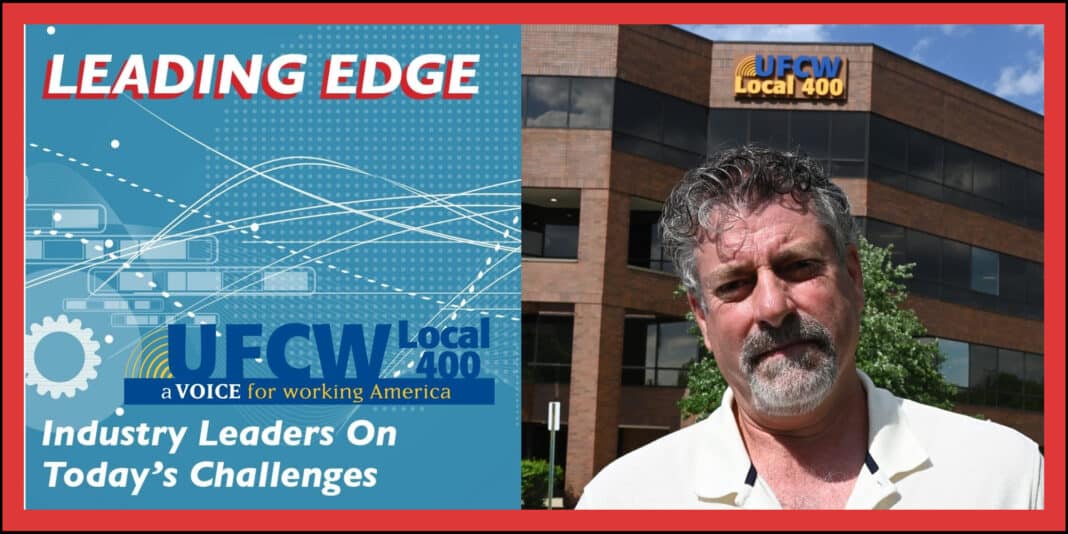Welcome to Leading Edge, a semi-monthly Q&A forum where some of the grocery industry’s top executives share their views on several current and important topics. This week’s interviewee is Mark Federici, president of United Food and Commercial Workers (UFCW) Local 400, one of the UFCW International’s largest local unions in the country representing more than 35,000 employees in Maryland, Virginia, Washington, DC, Ohio, Kentucky, Tennessee, West and Virginia. Federici first joined the UFCW in 1984 when working for Riverside Markets in Pennsylvania. In 1991, he began his career at Local 400 as an organizer and rose steadily through the ranks to ultimately become president of the Landover, MD-based labor organization in 2013. Federici shares his views about pension liability reform, his learnings from COVID and the recent successful organizing of companies that were previously non-union.
1)What did you learn most about your members and their employers during COVID?
What I learned most about our members during COVID are actually things that I already knew: their unquestioned dedication and professionalism, as well as the courage it took for them to show up to work day in and day out, is remarkable. Our members in all industries showed an esprit de corps for their communities, customers and coworkers. That is nothing short of extraordinary. Absolutely astounding! We should all be in awe. We should never forget.
What I learned about our employers is also something I already knew: most sincerely care about the well-being of their workforce, but having said that, some care more than others. Most work hard to maintain a safe workplace and feed their communities. Others, such as one major national employer, purposely chose sales over safety. It’s unbelievable to me that a corporation could and would make such a choice. They placed people’s lives at risk, and that risk was not limited to their workforce, but as a result of the nature of COVID, their irresponsibility put their employees’ families at risk as well. This fact, and this irresponsibility, and their willingness to do that, was nothing short of astonishing.
2)During the past two years, Local 400 has arguably been the leading labor organization in helping provide a solution to the huge pension liabilities that exist with many plans both in the Baltimore-Washington area and nationally. What specifically have you helped create and why is this important?
The first thing I would say is that we have the fortune to work with some of the best ERISA [Employee Retirement Income Security Act of 1974] experts in the country – bar none. I can honestly say that what we helped create was a result of all parties taking on a huge challenge constructively. There were obviously differences of opinion, but we worked very diligently to solve the problems. To steal a movie line, ‘failure was not an option.’ What I hope we created is an atmosphere of problem-solving and constructive solutions that will carry on into the future.
3) Over the past six months, a lot of attention has been paid to the organizational attempts and successes at some of America’s largest non-union companies. Is this just a trend or the beginnings of a long-term rebirth of a national labor expansion effort?
I sincerely think it could be a rebirth. I believe COVID has done a reset on the American workplace. My sense is that people’s expectations for their work experience has changed. The reset involves what people are willing to do and what expectations they have for what they get for what they do. People are expecting more as a result of COVID. That experience is now enhanced by inflation – it’s not just a desire, it’s a necessity. The cost of basic needs, such as gas, housing and tuition, have been going up dramatically. Some mothers can’t even get baby formula. But as those costs have gone up, paychecks have stayed the same. American workers’ incomes must improve.
4) As the retail landscape in the Baltimore-Washington market continues to shift, what are the essential components needed to keep your current membership viable and potential new members interested in joining a labor organization?
I think it’s important to remain flexible in one’s thinking. That has to be done without the sacrifice of the core principles of fairness and dignity in the workplace. We operate in an enormously competitive market and our local union cannot wish that away. Competition is a reality. None of us can run away from it. Our viability extends from core issues of fairness, improvement of economic status, and respect. These issues will also never go away.
5) What do you consider the most challenging part of your job? The most rewarding?
There are many challenges to my job. It’s very difficult to identify what’s the most challenging on any given day. If I had to pick one challenge, it would be balancing my responsibility leading an organization that rewards working families for their hard work and dedication to their industry, while operating in a very competitive space for employers. Striking this balance is the most challenging aspect of my job. Truly the most rewarding part of my job are the wonderful people I work for, our membership. Whether it’s retail grocery, retail, poultry or meat production, healthcare or law enforcement, the relationships I have with so many amazing people is hands down the most rewarding aspect of my job. Our members are the salt of the earth, wonderfully amazing people. I’m truly blessed.


